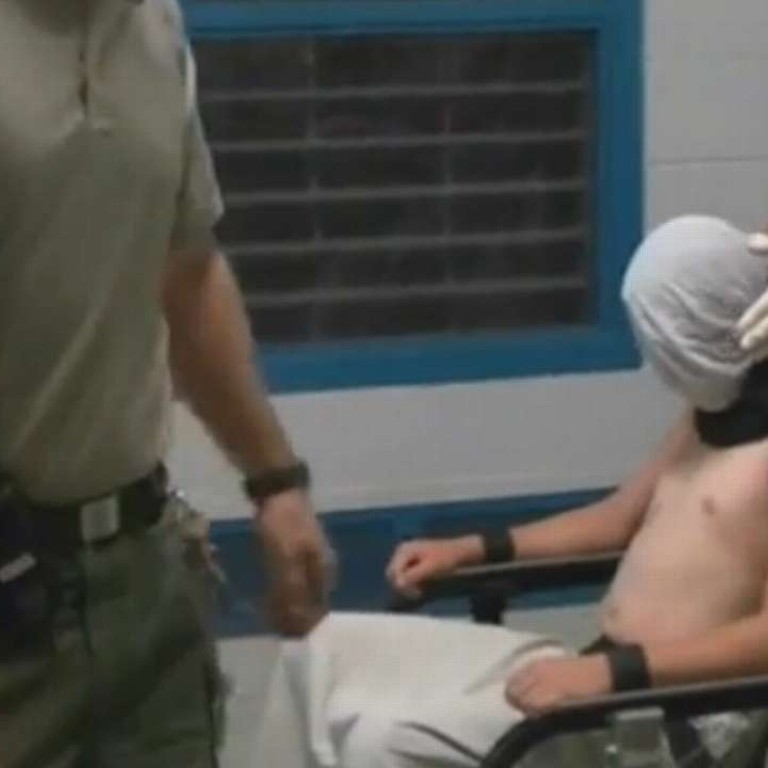
In wake of Don Dale scandal, Australia’s political leaders urged to reform ways of dealing with youth offenders
The Northern Territory should introduce youth justice and diversionary programmes in Aboriginal communities so that low offenders can be disciplined and rehabilitated without being locked up thousands of kilometres away, political leaders have been told.
Less than 24 hours after they took to a Darwin stage in suits for a televised debate, the NT chief minister, Adam Giles, and the opposition leader, Michael Gunner, stood in a hot bush clearing near Kalkarindji, sweating through their cotton shirts.
The joint meeting of the Central and Northern Land Councils, which had been held there, had already discussed what was to be put to the visiting leaders. The election was a little more than a week away. The lists were written on huge yellow pages and pinned to boards.
Giles was first. People were angry about the Don Dale detention centre and the treatment of young children – mostly Indigenous. Some said they were already aware of the violence before the Four Corners programme on ABC, and they pleaded for a change to the system in which their young people made up 96 per cent of the inmates.
Mildred Inkamala suggested that the youth locked up for minor offences should be brought back to the country, and that diversionary or corrections programmes should be run among their families and communities.
“Maybe the high risk mob, they can stay ...” she began.
“But treated as equals,” an older man yelled out.
“We got family in the prison there. I understand they’ve been stealing and breaking into houses, but we want more programmes at home,” Inkamala said.
Giles said he would take the suggestion on board, but “it’s probably best that I leave it to the royal commission to take a look at new ways of youth detention ... and maybe that is going out to the community and doing that”.
Another spoke of the violence in their communities, especially among children.
“We want our discipline rights back ... little children are getting involved, carrying weapons, and we don’t want to see them end up in Don Dale ... we need to discipline our own kids.”

Some of the delegates had spoken with the royal commissioners who had visited the previous day. There was concern the tentative March reporting date would not offer enough time to get to the heart of the problem, but they were told the commissioners could ask for more time if needed.
One man brought up Giles’ recently resurfaced comments from 2010 that if he had been corrections minister he would “build a big concrete hole and put all the bad criminals in there” even if he broke United Nations conventions.
Giles apologised, and said the comments came from frustration with the government at the time.
Others spoke of jobs, again to keep young people out of trouble but also to provide real and meaningful employment.
”We want to work for real money, instead of dole money,” said one man.
“We want to get decent jobs but we’re being treated like mission times”.
Giles said he could not promise to give everyone a job but improving housing and the economy was a big part of creating real jobs in communities.
Barbara Shaw, from one of Alice Springs’ town camps, said the Community Development Programme money “can’t even pay the rent”, and they wanted real jobs such as more Indigenous ranger positions.
“That’s the best place for our people to look after our country,” she said.“Climate change is coming, and no government has ever started to address climate change. Water is scarce for us in the desert.”
The federal Indigenous affairs minister, Nigel Scullion, revealed later in the meeting a commitment of ranger funding up to 2020, and said increases would be considered.

Giles took questions for more than 40 minutes. He was followed by Gunner, who was introduced to the crowd with the instruction: “you can flog him now”.
Gunner noted Labor’s role in land rights history – then prime minister Gough Whitlam returning the land to the Gurindji – but conceded it sometimes “had to be reminded” to listen more.
He too addressed the Don Dale scandal, and repeated his apology on behalf of the Labor party.
“When your children are in our care, we are the parent, and it’s clear we didn’t fulfil our duty of care.”
Gunner said the royal commission would drag up ministers, public servants and guards, “and everyone will be held accountable”, but in the meantime changes would be made, including moving youth justice out of the corrections portfolio.
Shaw said the guards who had stripped and hit juvenile detainees should be jailed, and urged the next government to “start working with the parents and the guardians today so we can work on preventative measures where we belong. We are the little people, you mob are the big people,” she said.
“It’s us that have got to be part of the conversation with government, so we can start taking care of ourselves and our communities.”
The joint council meeting was held at Kalkarindji on the eve of the Freedom festival, commemorating 50 years since the Wave Hill walk-off.
Earlier on Thursday, delegates heard information about fracking laws and regulations, which could change dramatically if Labor wins the NT election next week and enacts its proposed moratorium.
The previous day, delegates had released a joint statement supporting moves to explore constitutional recognition that would “deliver meaningful and enduring benefits for our peoples”.
“We are prepared to examine models for constitutional recognition that deliver such benefits,” it said.
“Any progress towards constitutional recognition must not endanger our rights to negotiate treaties to finally achieve self-determination.”
The delegates said the constitutional information forums must be held in the bush with Aboriginal people.

